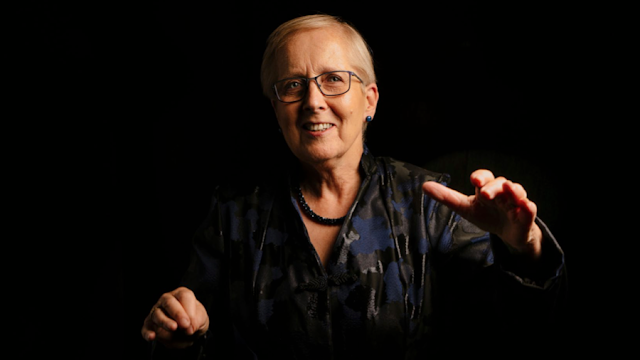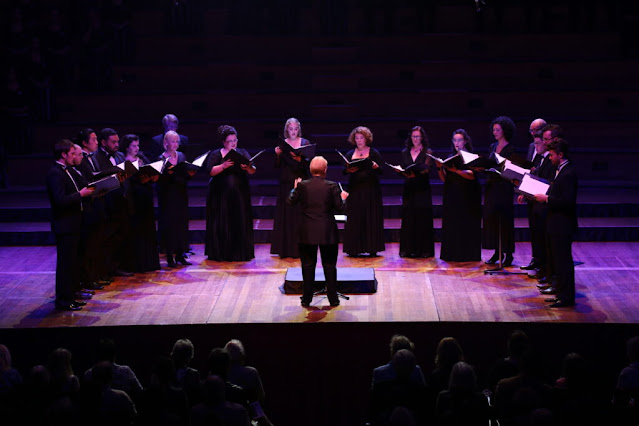 |
| Karen Grylls |
Karen Grylls is the founder and conductor of Voices NZ (Voices New Zealand Chamber Choir), one of the major chamber choirs in New Zealand. The choir's range is wide, in the past they have collaborated with Dame Kiri Te Kanawa and with the Kings Singers whilst when we spoke, they had just been working with composer Eric Whitacre on his Sacred Veil. Other major recent projects include Voices Love Opera, an event that had to be abandoned due to COVID but which saw the group performing operatic repertoire including music from Nico Muhly's Two Boys.
The choir also engages extensively with New Zealand composers, in 2017 they performed Passio by the late Jack Body (1944-2015), in an immersive staging of a work inspired by 16th century chant and involving six New Zealand composers. Since 2000, the choir has also been extending its engagement with Māori composers and Māori music. In 2014 they performed Requiem for the Fallen [a work which was subsequently recorded] created by composer Ross Harris, poet laureate Vincent O’Sullivan and taonga pūoro (Māori traditional instruments) specialist Horomona Horo to commemorate the centenary of World War I, for an ensemble that placed Māori instruments alongside the singers.
Karen studied in New Zealand and then the USA. Back in New Zealand she was asked to audition for the role of conductor of the New Zealand Youth Choir which had been founded in 1979 by Peter Godfrey and Guy Janson. She then has spent 22 years at the helm of the New Zealand Youth Choir and the New Zealand Secondary Students Choir. By the time she had worked through several iterations of students in these ensembles, she realised that there was no suitable national ensemble for the young singers to move on to, that they needed a place with a professional level of music making.
 |
| Karen Grylls & Voices New Zealand Chamber Choir |
She comments that the singers of the National Youth Choirs of Great Britain finish at an earlier age than those in New Zealand, but in the UK the young singers have a so many possible options. But in New Zealand, which has a population of just 5 million, there are far fewer opportunities for young adult singers to sing at a professional level. and there are certainly not enough opportunities for young adult singers to make a living as a professional singer. Overnight, she decided to found Voices NZ for those over 25, and thus too old for the youth choir.
This resulted in the establishment of a brand, Choirs Aotearoa New Zealand or CANZ under which came the youth choir and Voices NZ, and now they have New Zealand Secondary Students Choir on board too. The ensembles have both pedagogy and repertoire in common, and with all three it is important to do commissions and to engage with Māori traditions and music making. The choral groups are thus part of the real big journey that New Zealand is engaged upon, engaging with Māori culture and protocol, building relationships. And for Karen, this has had an interesting impact not only on what they sing but the way that they sing it.
Karen is about to step down from her post at university (she is Associate Professor in Choral Conducting at the University of Auckland) and will be spending more time with another newly formed group, the New Zealand Childrens Choral Academy, with the idea of developing skills and experience in children so that they can feel the national choirs.
 |
| New Zealand Youth Choir |
Voices NZ is a flexible ensemble, often performing as a chamber choir with 16 or 25 singers but sometimes using 60 to 70 singers. Working with Eric Whitacre recently they used just 24 singers, but when Donald Runnicles was going to conduct Beethoven's Missa Solemnis in New Zealand (a project cancelled by COVID) they had the skills to provide the choir. In November they are performing Mozart's Requiem with the New Zealand Symphony Orchestra, conductor Gemma New, with some 50 singers [further details]. The national choirs give singers both the skills and the opportunities to perform things that they might not do in regional choirs. They present choral singing at the national level, so that at the recent memorial service for Queen Elizabeth II, Voices NZ performed Hine e Hine arranged by Māori composer Robert Wiremu.
But it still comes back to the core repertoire, Karen comments that if singers don't have the skills to sing Bach, then they will not have the skills for later music. The Western choral canon is built on a cappella music, and this needs a lot of skills. At the moment Karen feels that singing in schools has dropped somewhat, and this area needs work to provide a firm basis. So, they are introducing these skills via the New Zealand Childrens Choral Academy, not only using the Kodaly Method but engaging in a wide variety of repertoire which includes Māori and Pasifika music.
Karen comments that Bach and Māori music require different skill sets. In Māori music there is a different way of performing, far less head voice and more chest, partly because this is a music to be sung outside. One of their earliest programmes to use Māori music was Spirit of the Land in 2006 which used all compositions by New Zealand composers. Later programmes mixed the two worlds together, for instance the choir improvising chant over music performed on Māori instruments, and Karen has always been interested in this sort of mix. The choir might perform a concert where we recognise every piece, or concerts where there is a real mix of pieces. Way back in 1988, the founder of the Youth Choir, Peter Godrey commented that the choir wasn't an English choir and that it needed to go a route away from this tradition. Now, Karen feels that they are very multicultural. With Māori music, the instruments use a different tonality to Western music, and they are learning to accommodate their style to the Māori world, trying to engage with Māori music from the inside out.
 |
| Karen Grylls & Voices New Zealand Chamber Choir (Photo Aja Letherby) |
For Karen, Voices NZ's singing aesthetic is holistic, being totally engaged in the body. Singers have to have the capacity to sing a straight sound but also to have warmth and a connection. Whilst the sound is not completely operatic, there is warmth and vibrancy, and for projects such as the recent one with Eric Whitacre they sang with a straighter sound. It is this varied palate which makes the choir so exciting, and people can be unsure who they are. But this very flexibility is part of the choir's ethos, they are quick to respond.
Whilst the singers are paid, the income is not enough to provide a regular professional job and many are teachers, bankers, optometrists, lawyers and such. Singers in the group have to have another income, another life. Voices NZ does around four or five major projects a year, and not every singer does everything. Many also sing in their regional choirs, after all singers have to keep up their skill. But all love it and give themselves to it. Now they are engaged in a journey to find out how to become a fully professional group.
Never miss out on future posts by following us
The blog is free, but I'd be delighted if you were to show your appreciation by buying me a coffee.
Elsewhere on this blog
- The Rime of the Ancient Mariner: a glorious pot-pourri of Purcell's music alongside Coleridge's poem read by Rory Kinnear - concert review
- Britten & Bridge's viola: Hélène Clément explores the two composers' shared love of the instrument - concert review
- Sweet Stillness: Handel's Nine German Arias receive some creative rethinking in these wonderfully engaging performances - record review
- From folk-inspired music to contemporary music mixing Carnatic and Western classical: finale concert of Hatfield House Chamber Music Festival - concert review
- Far more than a musical curiosity: fine musical drama in ETO's revival of Handel's Ottone - opera review
- Theatrical grandeur: ENO launches its new season with Christoph Loy's new production of Tosca - opera review
- From Scandinavia to Buenos Aires by way of Paris and Vienna: the Hatfield House Chamber Music festival opens with a showcase for its varied artists - concert review
- A wonderfully vivid evening: Blackheath Halls Opera in Bernstein's Candide - opera review
- Much more than niche repertoire: Tredegar Band's Vaughan Williams on Brass - record review
- Edward Gardner & the LPO's Autumn season opened in spectacular fashion with Schoenberg's Gurrelieder; composer Florence Anna Maunders was there - concert review
- From low comedy and satire to subtlety and sophistication: conductor John Andrews chats about Lampe's The Dragon of Wantley, Gilbert & Sullivan and more - interview
- A rare appearance in London, but a welcome one to be sure: Offenbach's La Princesse de Trébizonde from Opera Rara - opera review
- Home











No comments:
Post a Comment